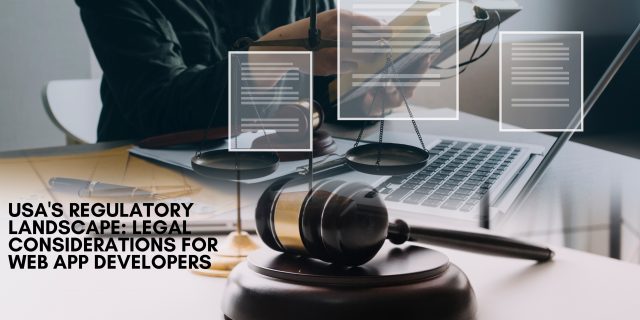The United States, with its vibrant and diverse digital landscape, presents both incredible opportunities and formidable challenges for web application developers. At the heart of this complex terrain lies a regulatory landscape that is as dynamic as the technology it governs. In this digital age, where web applications have become integral to modern life, it is crucial for developers to navigate this intricate web of laws and regulations with precision and foresight.
As we delve deeper into the nuances of U.S. regulations, you will discover that these considerations go far beyond mere compliance. They shape the very foundation of trust and credibility that your web application builds with users, businesses, and investors. From data privacy to intellectual property rights, accessibility standards to consumer protection laws, each facet of regulation plays a vital role in shaping your web app’s reputation and longevity in this competitive marketplace.
Statistical Snapshot: Laws and Regulations for Web App Devs
- Data privacy and security: According to a recent survey by the Ponemon Institute, the average cost of a data breach in the US is now $9.44 million. This is up from $8.64 million in 2022.
- Intellectual property rights: The US Copyright Office received over 5.8 million copyright registrations in 2022. This is the highest number of registrations ever received in a single year.
- Consumer protection laws: The Federal Trade Commission (FTC) received over 5 million consumer complaints in 2022. This is the highest number of complaints ever received in a single year.
- Accessibility requirements: According to a recent study by the Web Accessibility Initiative (WAI), only 29% of websites fully comply with the Web Content Accessibility Guidelines (WCAG) 2.1.
- The number of lawsuits alleging violations of the Americans with Disabilities Act (ADA) related to website accessibility has increased by 175% in the past five years.
The Importance of Compliance for Web App Developers in the USA
- Compliance is required by law. If you don’t comply with applicable laws and regulations, you could face serious consequences, including fines, injunctions, and even criminal charges.
- Compliance is essential for protecting users. Web apps often collect and process sensitive user data, such as names, addresses, and financial information. Compliance with data privacy and security laws helps to protect this data from unauthorized access, use, or disclosure.
- Compliance builds trust and credibility. By demonstrating your commitment to compliance, you can build trust and credibility with users, partners, and investors. This can lead to increased business opportunities and success.
A Guide to Legal and Regulatory Compliance in the USA
Data privacy and security
Data privacy and security laws are some of the most important laws and regulations for web app developers to be aware of. These laws require developers to take steps to protect user data from unauthorized access, use, or disclosure.Some of the specific requirements of data privacy and security laws include:
Obtaining user consent:
Developers must obtain user consent before collecting or using certain types of data, such as sensitive personal information or tracking data. Consent should be freely given and informed.Providing users with access to their data:
Users have the right to access their data and to request that businesses delete their data.Reporting data breaches:
Developers must report data breaches to users and to the appropriate authorities in a timely manner.
Some of the key data privacy and security laws that web app developers in the USA need to be aware of include:
General Data Protection Regulation (GDPR):
The GDPR is a European law that requires businesses to comply with strict data privacy and security requirements when collecting and processing the personal data of EU residents.California Consumer Privacy Act (CCPA):
The CCPA gives California residents the right to know what personal data businesses are collecting about them, to request that businesses delete their personal data, and to opt out of having their personal data sold.Health Insurance Portability and Accountability Act (HIPAA):
HIPAA is a US law that protects the privacy and security of health information. Web app developers who collect and process health information must comply with HIPAA regulations.
Intellectual property laws
Intellectual property (IP) laws protect the creative works and inventions of individuals and businesses. Web app developers need to be aware of IP laws and take steps to avoid infringing on the IP rights of others.Some of the key IP laws that web app developers in the USA need to be aware of include:
Copyright law:
Copyright law protects original works of authorship, such as literary, dramatic, musical, and artistic works. Web app developers need to be careful not to infringe on the copyright rights of others when developing their apps.Trademark law:
Trademark law protects words, phrases, symbols, and designs that are used to identify the source of goods or services. Web app developers need to be careful not to infringe on the trademark rights of others when developing their apps.Patent law:
Patent law protects inventions that are new, useful, and non-obvious. Web app developers need to be careful not to infringe on the patent rights of others when developing their apps.
Consumer protection laws
Consumer protection laws prohibit web app developers from engaging in unfair or deceptive practices. For example, web app developers cannot spam users or misrepresent their products or services.Some of the key consumer protection laws that web app developers in the USA need to be aware of include:
Fair Credit Reporting Act (FCRA):
The FCRA regulates the use of consumer credit reports. Web app developers who use consumer credit reports must comply with the FCRA.Federal Trade Commission Act (FTC Act):
The FTC Act prohibits unfair or deceptive trade practices. Web app developers must avoid engaging in any practices that could be considered unfair or deceptive under the FTC Act.
Accessibility laws
Accessibility laws require web app developers to make their apps accessible to users with disabilities. This means that apps should be designed and developed so that they can be used by people with a variety of disabilities, such as blindness, deafness, and mobility impairments.Some of the key accessibility laws that web app developers in the USA need to be aware of include:
Americans with Disabilities Act (ADA):
The ADA requires businesses to make their goods and services accessible to people with disabilities. This includes web apps.Web Content Accessibility Guidelines (WCAG):
The WCAG are a set of guidelines that provide guidance on how to make web content accessible to people with disabilities. Web app developers should strive to comply with the WCAG.
Industry-specific laws and regulations
In addition to the general laws and regulations discussed above, web app developers may also need to comply with industry-specific laws and regulations. For example, developers of healthcare apps must comply with HIPAA regulations and developers of financial apps must comply with the Gramm-Leach-Bliley Act (GLBA).
In addition to this, Web app developers should research the industry-specific laws and regulations that apply to their apps and take steps to comply.
Building Trust and Staying Legal: Best Practices for Web App Developers

Develop a Compliance Plan:
Purpose:
The compliance plan is a comprehensive document that outlines how your business intends to adhere to relevant laws and regulations. It serves as a roadmap for legal and regulatory compliance.Tailoring:
Customize the plan to your specific business operations and the types of data you handle. Different industries and data types may have unique compliance requirements.Regular Updates:
Periodically review and update your compliance plan to reflect changes in the law, industry standards, and your business practices. It should remain a living document that evolves with your web app.
Conduct Regular Risk Assessments:
Purpose:
Risk assessments help you identify and understand the potential risks your business faces concerning legal and regulatory compliance.Process:
Analyze your web app’s operations, data handling, and security practices to identify vulnerabilities and compliance gaps.Mitigation Strategies:
Develop mitigation strategies to address identified risks. Prioritize and implement measures to reduce or eliminate potential legal and security threats.
Implement Appropriate Security Measures:
Data Encryption:
Use strong encryption methods to protect sensitive user data both in transit and at rest.Patch Management:
Regularly update and patch software to address vulnerabilities promptly.Access Controls:
Implement role-based access controls to limit who can access sensitive data and establish monitoring systems to detect unauthorized access.
Obtain User Consent:
Data Types Requiring Consent:
Identify and clearly communicate to users the types of data that require their consent, such as sensitive personal information or tracking data.Freely Given and Informed:
Ensure that user consent is obtained freely, without coercion, and that users are fully informed about what data is collected, how it will be used, and with whom it may be shared.
Provide Users with Access to Their Data:
Data Access Requests:
Establish a mechanism that allows users to easily request access to their data and to request its deletion. Respond to these requests promptly and transparently.Data Deletion:
Implement procedures for securely deleting user data when requested, ensuring it is irretrievable.
Report Data Breaches:
Timely Reporting:
Develop a clear protocol for responding to data breaches. If a breach occurs, notify affected users promptly and inform the appropriate regulatory authorities in accordance with data breach notification laws.
Train Your Employees on Compliance:
Employee Awareness:
Educate your staff about your compliance policies, procedures, and their individual compliance responsibilities.Regular Training:
Conduct regular training sessions and keep employees updated on changes in regulations and compliance practices.
Work with a Qualified Attorney or Compliance Professional:
Legal Expertise:
Collaborate with a qualified attorney or compliance professional with expertise in technology and data privacy. They can provide valuable insights, assist in creating and updating your compliance plan, and offer guidance on compliance matters specific to your web app.
By implementing these practices and continually monitoring and updating your compliance efforts, web app developers can mitigate legal risks, protect user data, and demonstrate their commitment to ethical and responsible business practices in the United States. Compliance is an ongoing process that requires vigilance and adaptability to meet the ever-evolving regulatory landscape.
Key Takeaways
The USA’s regulatory landscape for web app developers is complex and ever-evolving. However, by understanding and complying with applicable laws and regulations, web app developers can avoid costly compliance issues and protect their businesses.
If you are a web app developer in the USA, we encourage you to contact GeekyAnts for assistance with compliance. GeekyAnts is a leading provider of web app development services, and we have a team of experienced compliance professionals who can help you to develop and implement a compliance plan, conduct risk assessments, and implement appropriate security measures.
Contact here to learn more about our compliance services and how we can help you to protect your business.
FAQ’s
How often should I update my terms of service and privacy policies?
It’s advisable to review and update your terms of service and privacy policies regularly, especially when there are changes in your app’s data handling practices or when new regulations are enacted. Transparency with users is key.
How can I ensure my web app complies with data privacy laws?
To comply with data privacy laws, ensure you have clear privacy policies, obtain user consent for data collection, secure user data with encryption, and have mechanisms in place for users to access and delete their data when requested.


















